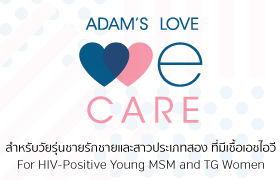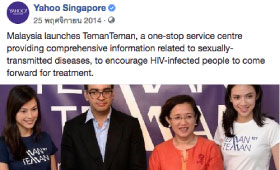|
|
IAS2017 - HIV risks among Thai transgender women and potential technology-based HIV prevention interventionsPlease download e-Poster here programme.ias2017.org/Abstract/Abstract/3348 Tarandeep Anand1, Chattiya Nitpolprasert1, Stephen J Kerr2,3,4, Thitiyanan Nakpor5, Wutthinan Champa6, Danai Linjongrat7, Surang Janyam8, Siriporn Nonenoy1, Jureeporn Jantarapakde1, Ratchadaporn Meksena1, Praphan Phanuphak1, Nittaya Phanuphak1, on behalf of Adam's Love Study Team 1The Thai Red Cross AIDS Research Centre, Bangkok, Thailand, 2HIV-NAT, The Thai Red Cross AIDS Research Centre, Bangkok, Thailand, 3Kirby Institute, University of New South Wales, Sydney, Australia, 4Academic Medical Center, University of Amsterdam, Institute for Global Health and Development, Department of Global Health, Amsterdam, Netherlands, 5Sisters Foundation, Chon Buri, Thailand, 6Caremat Organization, Chiang Mai, Thailand, 7Rainbow Sky Association of Thailand, Bangkok, Thailand, 8Service Workers In Group Foundation, Bangkok, Thailand Background: Transgender women (TG) in Thailand with HIV prevalence ranging between 10-17%, experience unique health inequities and face multiple barriers to accessing HIV services. A paucity of research exists on their HIV vulnerability and how interventions should be designed to address TG-specific needs. We examined HIV risk characteristics and elicited strategies for HIV prevention interventions from a sample of Thai TG. Methods: TG participants were randomly recruited from community-based organizations (CBOs), TG-focused and gender-friendly clinics, websites, and online TG networks. Self-administered survey links, containing questions on socio-demographic, stigma, risk behaviors, technology use and preferences for technology-based interventions, were distributed via e-mail, instant-messaging (IM) applications and social media networks to interested participants. Results: Of 541 TG recruited, 212 (39.2%) responded to the survey from CBOs (45.3%), clinics (21.2%), websites (24.5%) and TG online networks (9%). Median age was 25 years (IQR: 22-30), 7.7% reported HIV-positive status, and 59.4% reported previous STIs. Mean HIV/AIDS knowledge score was 9.56 (SD = 3.4) out of 16. Mean age at first sex was 14.1 years (SD = 6.75). In the past 6 months, 23.6% had >5 partners and 47.2% inconsistently used condoms. In the past 3 months, 35.5% had exchanged sex for money, 18.8% used recreational drugs, and 10.3% had group sex. Gender identity had caused fear among 45.8% to receive health care and 39.1% had ever been rejected from providers. More than half (54.7%) spent >8 hours using Internet per day and 43.4% had sought sex online in the past 3 months. To optimize HIV prevention, a credible website featuring TG-friendly HIV testing sites (61.3%), TG-specific health videos (51.9%), health forums (57.6%) and eCounseling (56.2%) was desired. A TG counselor (63.2%) was the most preferred eCounselor, followed by a woman (18.4%), and a man (10.4%). Personalized HIV and health-related reminders were acceptable for 84.4% with IM applications (44.7%) and SMS (21.8%) being the most preferred platforms. Conclusions: Among Thai TG who were mainly young, at high-risk, and felt stigmatized by health care system, technology-based interventions proved to have very high potential to deliver needed support in non-stigmatizing settings and link TG from online to offline HIV clinical services. |















